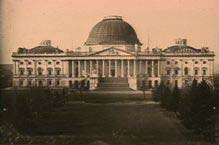The Aftermath of War
Vast New Territories
by Robert W. Johannsen
University of Illinois at Urbana-Champaign
 What did the Mexican War mean to Americans in the mid-19th century? The answer reflects the nature and character of mid-century America itself. Americans were reaching out beyond their border. Advancements in transportation and communications technologies were dissolving the nation's geographic and cultural isolation. Commerce expanded and travel increased as interest in exploration carried Americans around the globe. The war was a "window" through which Americans saw a strange and exotic land of alien manners, customs, and attitudes. Many were convinced that America would never be the same.
What did the Mexican War mean to Americans in the mid-19th century? The answer reflects the nature and character of mid-century America itself. Americans were reaching out beyond their border. Advancements in transportation and communications technologies were dissolving the nation's geographic and cultural isolation. Commerce expanded and travel increased as interest in exploration carried Americans around the globe. The war was a "window" through which Americans saw a strange and exotic land of alien manners, customs, and attitudes. Many were convinced that America would never be the same.
Some observations of the war were more pragmatic. The "Democratic Review" noted that the war's end meant the "reduction of our enormous expenses by the withdrawal of the army, and the cessation with it of the excessive jobbing which has been so long going on" (May 1848). After the treaty was ratified, some critics of the war acquiesced, that the war had shown "that a people…devoted to the arts of peace, possessing free political institutions, can vanquish a military people, governed by military despots" ("Merchant's Magazine," April 1848).
Some critics predicted that the "impenetrable mountains and dry narrow valleys" of California and the "trackless, treeless…and utterly uninhabitable" New Mexico — would prove useless, threatening the nation's frontier settlements and draining the national treasury. Some believed that Mexico rid itself of worthless land and received $15 million from the U.S. for the sacrifice.
Vast new territories had been incorporated as part of the United States. On July 4, 1848, the ratification of the Treaty of Guadalupe Hidalgo by the Mexican Congress arrived at the White House. That same day the cornerstone of the Washington Monument was dedicated.
Robert C. Winthrop, Congressman from Massachusetts and Speaker of the House of Representatives, delivered the dedication oration. The occasion, he noted, marked "the precise epoch at which we have arrived in the world's history and in our own history." A war against a foreign foe had been won, and he paid tribute to the "veterans of the line and the volunteers." The "great American-built locomotive, 'Liberty'" moved "on the track of human freedom, unimpeded and unimpaired; gathering strength as it goes; developing new energies to meet new exigencies," with a swiftness that "knows no parallel." By the end of the day, the dedication of the monument became even more symbolic that anyone had expected. "This great anniversary," declared on citizen, "has never come in, with more of enjoyment to be thankful for, and more of promise to cheer and encourage us."
Never before had American independence been "more joyfully commemorated." The accomplishments of "our brave and magnanimous army in Mexico" recalled the struggles of the Revolution of Independence and the leader of that revolution now stood forth as the "founder of an empire" which would soon eclipse anything that the "world has heretofore produced."





